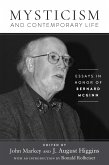Spiritual Progress is a collection of five theological works by closely connected French philosophers of the seventeenth century. These essays exude mysticism and they are intended for prayers with the emphasis on the closeness and intimacy with God. François Fénelon was a Catholic archbishop, theologian, poet and writer. Madame Guyon was a French Christian accused of advocating Quietism, and victimized for her ideas of mysticism, but was later celebrated. Père Lacombe was a Catholic monk and Madame Guyon's guide and mentor in spiritual matters. Table of Contents: Christian Counsel by François Fénelon Spiritual Letters by François Fénelon Method of Prayer by Madame Guyon On the Way to God by Madame Guyon Spiritual Maxims by Père Lacombe
Dieser Download kann aus rechtlichen Gründen nur mit Rechnungsadresse in A, B, BG, CY, CZ, D, DK, EW, E, FIN, F, GR, HR, H, IRL, I, LT, L, LR, M, NL, PL, P, R, S, SLO, SK ausgeliefert werden.




